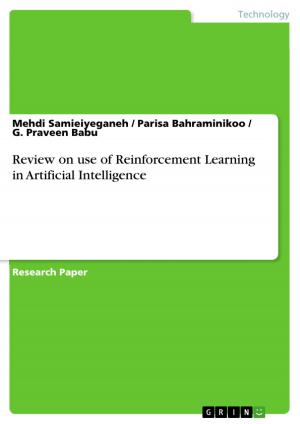Considerations on Green Political Thought - A new, ecological ideology?
A new, ecological ideology?
Nonfiction, Social & Cultural Studies, Political Science, Politics, History & Theory| Author: | Florian Heyden | ISBN: | 9783638479967 |
| Publisher: | GRIN Publishing | Publication: | March 16, 2006 |
| Imprint: | GRIN Publishing | Language: | English |
| Author: | Florian Heyden |
| ISBN: | 9783638479967 |
| Publisher: | GRIN Publishing |
| Publication: | March 16, 2006 |
| Imprint: | GRIN Publishing |
| Language: | English |
Bachelor Thesis from the year 2005 in the subject Politics - Political Theory and the History of Ideas Journal, grade: First (80% - very good), Aston University, 38 entries in the bibliography, language: English, abstract: The idea of a Green political ideology is a relative newcomer to political theory. Even though Green writings have developed rapidly since the early 1970s, the issue of Green ideology has remained on the whole much neglected. It was not until the mid-1990s that the question of Green ideology emerged fully into theoretical discourse, some scholars still contest the existence of a separate and independent Green political ideology. But is Green thought really an ideology? Is it not rather an accumulation of various different, often contradictory elements of thought gathered from a range of other ideologies? The question which will be considered in this essay is in how far the claim of a separate Green ideology is actually justified and what the term 'Green' stands for, if it concerns merely questions of ecology or goes beyond this narrow definition. In order to do this, this study will begin by providing the reader with a number of fundamental considerations concerning ideology, including structural and practical formations. This part will most fundamentally try to answer the question 'what is ideology'. These reflections will be followed in part two by a broad outline of Green thought in which a number of fundamental assumptions will be discussed, which will be expanded on in part three. A conclusion will be drawn on a number of contextual and normative considerations, resulting from these assumptions and more detailed aspects will be discussed to clarify that in fact Green political thought should be seen as a distinct ideology in its own right, addressing a wide range of social concerns having permeated into larger political discourse.
Bachelor Thesis from the year 2005 in the subject Politics - Political Theory and the History of Ideas Journal, grade: First (80% - very good), Aston University, 38 entries in the bibliography, language: English, abstract: The idea of a Green political ideology is a relative newcomer to political theory. Even though Green writings have developed rapidly since the early 1970s, the issue of Green ideology has remained on the whole much neglected. It was not until the mid-1990s that the question of Green ideology emerged fully into theoretical discourse, some scholars still contest the existence of a separate and independent Green political ideology. But is Green thought really an ideology? Is it not rather an accumulation of various different, often contradictory elements of thought gathered from a range of other ideologies? The question which will be considered in this essay is in how far the claim of a separate Green ideology is actually justified and what the term 'Green' stands for, if it concerns merely questions of ecology or goes beyond this narrow definition. In order to do this, this study will begin by providing the reader with a number of fundamental considerations concerning ideology, including structural and practical formations. This part will most fundamentally try to answer the question 'what is ideology'. These reflections will be followed in part two by a broad outline of Green thought in which a number of fundamental assumptions will be discussed, which will be expanded on in part three. A conclusion will be drawn on a number of contextual and normative considerations, resulting from these assumptions and more detailed aspects will be discussed to clarify that in fact Green political thought should be seen as a distinct ideology in its own right, addressing a wide range of social concerns having permeated into larger political discourse.















